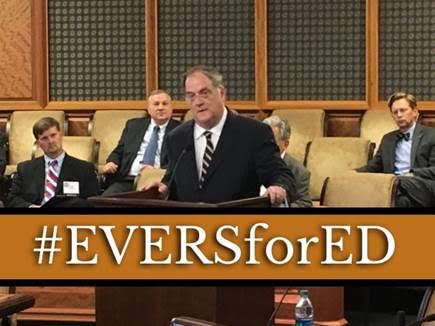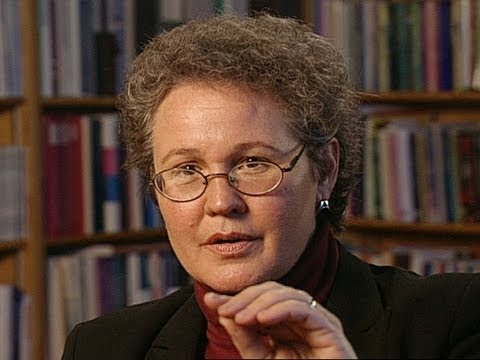Archive for the ‘Open Letter’ Tag

I agree with Joy Pullman: “I shouldn’t have to give a flying fig about whom Donald Trump picks for this position.”
But we care, and the figs are flying, because there’s so much power unconstitutionally wielded by the executive branch over local education.
Although Trump did say in a campaign interview that he wanted to eliminate the Department of Education, it does not look as though that’s going to happen, sadly. The next best thing is to name a local-control oriented, constitution-loving Education Secretary.
Will Trump do that?
Trump’s choice of ed guru Bill Evers to his transition team spoke hope to those opposed to Common Core. Evers, a scholar at Hoover Institute (Stanford University) had been speaking out and writing books, white papers, think tank documents, and columns against Common Core; he served on panels and published opinion editorials against the nationalization of our formerly autonomous educational system. He’d been featured widely for his scholarship and activism; see for example, Breitbart, CSPAN, Stanford University, Utahns Against Common Core, Education Reporter.
Evers proclaimed that Common Core “violated the traditions of open debate and citizen control that are supposed to undergird public schooling” and said that “Common Core’s national uniformity runs counter to competitive federalism”.
Surely Evers would turn the Common Core machine around, thought parents and freedom loving teachers across this nation, and they took action.
A public letter from United States Parents Involved in Education last week pleaded with Trump to choose Dr. Bill Evers for Education Secretary. (See who signed that letter here.)

A similar public letter from Parents Against Common Core asked Trump to consider, along with Dr. Bill Evers, Dr. Larry Arnn, Dr. Sandra Stotsky, Dr. Peg Luksik, or Dr. William Jeynes.
You can still sign that letter here.
Frighteningly though, this week Trump interviewed Michelle Rhee, one of the top ten scariest education reformers in the nation, for the job; the scandal-pocked former Commissioner of Education in D.C. and author of a creepy ed reform book, “Radical” is no friend to children, to opt-out liberty, or to the free market. Of “letting them choose wherever they want to go,” she said, “I don’t believe in that model at all.” So, Goodbye freedom, under Rhee.
There should be no chance that she’s chosen. (Even though she’s suddenly, cutely, dressing in red, white and blue to meet the president elect, do not be fooled!)
I hope Trump’s receiving a storm of anti-Rhee letters this week from parents and educators at his public input website. He’s probably going to make his announcement this week. Please, please speak up.

#BillEvers for Secretary! #NeverRhee!

Update for locals: tonight, Alpine School District will be having a meeting; that’s May 17 at 6 p.m., to discuss the transgender bathroom issue and how it will affect your child. If you have anything to say or if you just want to know what’s happening locally due to Obama’s crazy new policy to let boys into girl’s locker rooms, bathrooms and showers, you might want to show up:
ASD District Office 575 N 100 E, American Fork, Utah 84003
Brian Halladay, Wendy Hart and Paula Hill, three members on the board of Utah’s largest school district, Alpine District, have written an open letter to the Utah legislature, governor, and state school board. It is posted here in full.
May 15, 2016
This letter is to urge you, as the Governor, Legislature, and State School Board to reject the guidance dictating actions regarding transgender students dated May 13, 2016.
The guidance in this letter states:
- “School staff and contractors will use pronouns and names consistent with a transgender student’s gender identity.”
- “When a school provides sex-segregated activities and facilities, transgender students must be allowed to participate in such activities and access such facilities consistent with their gender identity.”
a. “A school may not require transgender students to use facilities inconsistent with their gender identity or to use individual-user facilities when other students are not required to do so.”
b. “School must allow transgender students to access housing consistent with their gender identity and may not require transgender students to stay in single-occupancy accommodations or to disclose personal information when not required of other students.”
This guidance would allow a boy that identifies as a girl to be allowed to use facilities such as bathrooms, locker rooms and showers with girls. This is not just a complete violation of privacy, but is morally reprehensible. The consequences of this social experiment would be disastrous, not only as an invasion of the rights of a majority, but also with the potential legal liability this could incur upon school districts and the state, if we were to adopt this egregious guidance.
Article X of the US Constitution states, “The powers not delegated to the United States by the Constitution, nor prohibited by it to the States, are reserved to the States respectively, or to the people.”
The federal government has no power to tell people what to do except in areas specifically authorized in the Constitution.
That means it has no right to invade our privacy, or to dictate that transgender students have access to facilities that would invade the privacy of other children.
The Department of Education has threatened that it may pull education funding from our State if we don’t comply. This is likely a baseless threat meant to force states into compliance. However, with only 8% of State funds coming from the federal government, this would be an ideal opportunity to declare Utah’s sovereignty, and to allow our children to be free from the tyrannical mandates of our federal government.
This level of federal overreach is as unprecedented as it is unconstitutional. As locally-elected board members, we will be voting for a budget next month that includes no federal funding at all. While we realize we will have to tighten our belts and reallocate funds to accomodate those necesssary programs, the safety and privacy of the students we were elected to serve outweighs the 6% that our district receives in federal funds. We would appreciate your support in this endeavor.
I urge you, as Utah’s representatives, to also push back against this guidance, protect the privacy of our children and move forward in making Utah the shining city on a hill.
Sincerely,
Brian Halladay, Alpine School District Board Member
Wendy Hart, Alpine School District Board Member
Paula Hill, Alpine School District Board Member
Update: The bill has been resurrected. HB164 will have another vote Monday. Please email and call/text legislators, asking them to vote “No” again. If this passes, Utah has set a precedent that says that parents do not know best, that they are not the resident experts of their own children; that the government’s SAGE/AIR tests are to be forced on children throughout the year in formative, interim and other tests; that data collected via these tests will be owned by the state, not by the individual; and that students who opt out and fail the class as a result, should blame themselves, and not the ridiculous, top-heavy system that has stymied freedom of education and freedom from unwelcome privacy invasion under the pretense that Common Core tests and standards are valid and helpful and harmless.
Emails:
Rep. Brad Last blast@le.utah.gov
Rep. Lowry Snow vlsnow@utah.le.gov
435-703-3688 435-703-3688
435-703-3688
Rep. LaVar Christensen lavarchristensen@le.utah.gov
801-808-5105 801-808-5105
801-808-5105
Rep. Kim Coleman kimcoleman@le.utah.gov
801-865-8970 801-865-8970
801-865-8970
Rep. Bruce Cutler brucecutler@le.utah.gov
801-556-4600 801-556-4600
801-556-4600
Rep. Steve Eliason seliason@le.utah.gov
801-673-4748 801-673-4748
801-673-4748
Rep. Justin Fawson justinfawson@le.utah.gov
801-781-0016 801-781-0016
801-781-0016
Rep. Francis Gibson fgibson@le.utah.gov
Rep. Eric Hutchings ehutchings@le.utah.gov
Rep. David Lifferth dlifferth@le.utah.gov
801-358-9124 801-358-9124
801-358-9124
Rep. Daniel McCay dmccay@le.utah.gov
801-810-4110 801-810-4110
801-810-4110
Rep. Carol Moss – D csmoss@le.utah.gov
801-647-8764 801-647-8764
801-647-8764
Rep. Michael Noel mnoel@kanab.net
435-616-5603 435-616-5603
435-616-5603
Rep. Marie Poulson – D mariepoulson@le.utah.gov
—————————————
What I wrote earlier:
—————————————
Dear Representatives,
Thank you so much for not allowing
HB164 to pass. I can’t tell you how grateful I am, both as a parent and as a teacher.
It would have been immoral to prevent children from graduating if they didn’t take yearlong, secretive, standardized tests; even more so, when that test, SAGE/AIR, had never been validated (it had never been shown to accurately test what it claimed to test).
The vote against
this bill also honored multiple
laws that hold parents as primary decision makers over the education of their children, with the state in a supporting role.
I honor you for this. Thank you.
Christel Swasey
————————————————————–

The following letter is reposted with permission from Libertas Institute, a Utah-based conservative think-tank. It was given to members of the Utah legislature two weeks ago.
It concerns the State Longitudinal Database System (SLDS) which was implemented in Utah –and in every state, thanks to federal bribery– just a few years ago.
Each SLDS runs according to federal specs and is interoperable. Thus, the fifty SLDS systems function together as a “de facto” federal stalking system on children, college students, and the members of the U.S. workforce. Every state’s “voluntary” SLDS feeds its data about citizens to the federal EdFacts data exchange.
Libertas Institute points out that SLDS was created and is being used without voter approval or representation; there was no legislative knowledge or debate, and there has been no effort to promote parental knowledge or to acquire parental/student consent for this massive, lifelong data mining project.
Action step: after you read this letter, please contact your legislators (here is contact info for Utah legislators, the governor and D.C. legislators) to put them on the task of creating, at the very least, an immediate, definite, parental-opt-out bill.
————————————————————————–

September 28, 2015
To: Members of the Administrative Rules Review Committee
Senators and Representatives,
The Utah State Office of Education (USOE) will be in your meeting tomorrow, among other
things, to explain the Statewide Longitudinal Data System (SLDS)—a large database that
stores a lengthy list of data points on each child in Utah’s public schools. We are concerned
with how this database was set up and how it’s being used; as we are unable to attend the
meeting, we wish to briefly outline key concerns for your consideration.
We allege that USOE created, and now operates, this database without any legislative
authorization or oversight. Further, the federal funding USOE has obtained in order to build
and operate the database has required them to make certain policy commitments, as you’ll
see below, that exceed their authority and circumvented any public discussion on the matter.
This letter outlines three actions of which you should be aware:
1. The “Four Assurances” promised by Governor Huntsman
2. A grant received by USOE to build the federally compliant SLDS
3. The 2015 grant announced just last week to further develop and utilize the SLDS
The “Four Assurances” promised by Governor Huntsman
On April 15, 2009, Governor Jon Huntsman signed an Application for Initial Funding under
the State Fiscal Stabilization Fund Program, submitted to the U.S. Department of Education.
The purpose of this application was to obtain federal “stimulus” dollars; here is the
explanation from the U.S. Department of Education (USDOE):
The State Fiscal Stabilization Fund (SFSF) program is a new one-time appropriation of $53.6 billion under the American Recovery and Reinvestment Act of 2009 (ARRA). Of the amount appropriated, the U. S. Department of Education will award governors approximately $48.6 billion by formula under the SFSF program in exchange for a commitment to advance essential education reforms…
Without legislative authorization or guarantee, the Governor made four assurances to the
USDOE—a required step in order to receive any many. Those assurances were as follows:
1. The State of Utah will take actions to “improve teacher effectiveness” and “address
inequities in the distribution of highly qualified teachers between high- and low-poverty
schools”
2. The State of Utah will “establish a longitudinal data system”
3. The State will –
1. Enhance the quality of the academic assessments it administers…
2. Comply with the requirements… related to the inclusion of children with
disabilities and limited English proficient students in State assessments, the
development of valid and reliable assessments for those students, and the
provision of accommodations that enable their participation in State assessments;
(Inclusion Assurance) and
3. Take steps to improve State academic content standards and student academic
achievement standards consistent with section 6401(e)(1)(A)(ii) of the America
COMPETES Act. (Improving Standards Assurance)
4. The State will ensure compliance with the requirements of section 1116(b)(7)(C)(iv) and
section 1116(b)(8)(B) of the ESEA with respect to schools identified under these sections.
(Supporting Struggling Schools Assurance)
Thus, without any legislation to back it up, the federal government was promised significant
policy reforms in the state: common education standards (“Common Core”), new
assessments, teacher evaluations, school grading, and a comprehensive data collection system.
All of this was done in pursuit of money; less than a year later, U.S. Secretary of Education
Arne Duncan announced that Utah had been showered with $741,979,396 through the
American Recovery and Reinvestment Act.
Utah lawmakers—and thus the public at large—were left out of the loop.
A grant received by USOE to build the federally compliant SLDS
Under the same Recovery (“stimulus”) Act, USOE was given a grant of $9.6 million to create
the Utah Data Alliance—a longitudinal database that was fully compliant with USDOE
requirements. While data systems had obviously existed previous to this grant, this one was
geared, as USOE wrote, primarily towards satisfying questions and requirements “asked by
the American Recovery and Reinvestment Act (ARRA), Institute of Educational Sciences
(IES), SLDS grants program; the ARRA, Race to the Top (RttT); and the State Fiscal
Stabilization Fund (SFSF) assurances”—all federal mandates tied to funding USOE desired.
The Utah legislature did not authorize the creation of the SLDS, to our knowledge. The only
statutory references we have been able to identify refer to the already-existing database. For
example, Senate Bill 82 in 2013 (which passed and was signed into law) had this language:
(e) “Utah Student Record Store” means a repository of student data collected
from LEAs as part of the state’s longitudinal data system that is:
(i) managed by the Utah State Office of Education;
(ii) cloud-based; and
(iii) accessible via a web browser to authorized LEA users.
(2) (a) The State Board of Education shall use the robust, comprehensive data
collection system maintained by the Utah State O*ce of Education…
According to USOE, a statewide longitudinal database—mostly complaint with federal
standards—had been in operation since 2005.
The 2015 grant announced just last week to further develop and utilize the SLDS
On September 17, 2015, the Institute of Education Sciences—a project housed within the U.S.
Department of Education—announced that Utah was awarded a grant under the Statewide
Longitudinal Data System Grant Program in the amount of _____AMOUNT______, along
with potential continuation grants to provide more funding in the years ahead.
USOE’s application for this grant , obtained through an open records request, sheds light on
the alarming nature of this project. In order to suggest legislative authorization for the SLDS
and Utah Data Alliance, USOE argues that “The Utah State Legislature awarded UDA
partners [individual state agencies] ongoing appropriations to support sustainability of the
original infrastructure (e.g., database, researchers, technicians, project director, and technical
contracts), which demonstrates the state’s commitment to the work and
mission of the UDA data warehouse.” In other words, narrow appropriations for data projects
in state agencies is being interpreted as blanket authority for, and support of, the overall
SLDS project. We feel this a misguided and unreasonable inference.
Further, USDOE’s Request for Applications document specifies that “a successful data system
rests upon a governance structure involving both State and local stakeholders in the system’s
design and implementation.” However, USOE’s application admits that only “A memorandum
of understanding governs the partnership. A governance plan documents the policies of the
partnership and is continuously updated and refined to address emerging governance issues.”
An MOU, which can continuously evolve free from vetted processes and public input, is
insufficient to govern the requirements of such a large database—one that has significant
privacy and security implications.
There are many disconcerting statements and policy priorities outlined in USOE’s
application, but our main concern here is that the real “stakeholders” have been completely
left out of the loop. From information we have gathered, the State Board of Education was
unaware of this grant application. No vote was taken on the issue. No legislative
authorization was given to compile this information on every child, make the information
available to state government agencies (including “individual-level data in the UDA data
warehouse”), or provide data to third parties. Most importantly, the true stakeholders are
almost totally unaware that this database even exists; Utah law recognizes that “the state’s
role is secondary and supportive to the primary role of a parent.”
You may be aware that Libertas Institute organized a lawsuit late last year against the State
Board of Education over its rushed adoption of Common Core, done in an e*ort to obtain
federal money under the Race to the Top grant. (A hearing is scheduled in a few weeks.) We
feel that a pattern exists within USOE, whereby education policy is dictated not with input
from parents and teachers, or even legislators or the State Board of Education, but by USOE’s
seemingly insatiable appetite for federal grants, which inevitably come with significant
strings.
If “strings” are to exist, then they must be openly discussed, debated, and authorized—not
agreed upon behind closed doors with the unscrutinized stroke of a pen.
You as legislators have been circumvented and deemed largely irrelevant on this issue.
Significant education policies are being adopted and implemented without public input. We
encourage you to take an active interest in this issue and bring transparency and scrutiny to
USOE grant applications and the policies that necessarily follow.
Sincerely,
Connor Boyack
President, Libertas Institute
785 E. 200 S., Suite 2, Lehi, UT 84043
801.901.0310
LibertasUtah.org
DOCUMENT SOURCES
1 Application for Initial Funding under the State Fiscal Stabilization Fund Program, http://
www2.ed.gov/programs/statestabilization/stateapps/ut-sub.pdf
“State Fiscal Stabilization Fund,” U.S. Department of Education, March 7, 2009, http://
2 www2.ed.gov/policy/gen/leg/recovery/factsheet/stabilization-fund.html
“UTAH STUDENT RECORDS EXCHANGE,” https://nces.ed.gov/programs/slds/pdf/
3 Utahabstract.pdf
“INFORMATION RELATED TO FY15 GRANTS,” http://nces.ed.gov/programs/slds/
4 grant_information.asp
“Enhancing Utah Data Alliance College and Career and Evaluation and Research Capabilities
5 through Web Technology,” http://libertasutah.org/drop/slds_2015.pdf


Utah’s Dr. Gary Thompson wrote an open letter to Dr. Linda Darling-Hammond tonight.
Dear Dr. Hammond:
How does placing students in front of an experimental test that has yet to undergo extensive validity measures equate to accountability in the traditional manner in which you speak?
Let me answer that question for you in three simple words:
It. Does. Not.
Regards,
Dr. Gary Thompson
I want to give context so that you can fully appreciate the letter’s significance.
Darling-Hammond, of Stanford University, is on the list of “Top Ten Scariest People in Education Reform” for good reasons. She works for private organizations that crush Constitutional control of education; she promotes and writes books about socialist redistribution of wealth, and she plays key roles in the Obama administration’s fed ed goals. She’s been an advisor and/or board member for:
1. The Obama Administration’s Equity and Excellence Commission
2. The CCSSO – Common Core co-creator
3. The NGA – Common Core co-creator
4. The CSCOPE of Texas
5. American Institutes for Research (AIR, Utah’s and Florida’s Common Core tester)
5. WestED (SBAC’s Common Core test partner)
6. National Academy of Education
7. American Educational Research Association
8. Alliance for Excellent Education
–and more.

Dr. Thompson pointed out to his Facebook friends that Dr. Linda Darling-Hammond has been very busily publishing this month.
Her sudden articles in the Huffington Post, The Hill, Stanford University, NEA, ECE and elsewhere show that now, while Congress heatedly debates the ESEA/No Child Left Behind disaster, she’s desperate to persuade Congress to use Common Core and its tests as “an engine to drive better educational practice.”
Darling-Hammond paints a pretty, distracting frame around her ugly baby, the Common Core. She pretends that the whole reason parents are pushing back is only high stakes testing and she mentions nothing else that parents are screeching about. Apparently to her, the Constitution has nothing to do with it; experimentation on children has nothing to do with it; data mining has nothing to do with it; unpiloted and shaky standards have nothing to do with it; validity-report-lacking tests have nothing to do with it. She keeps the “conversation” on the clearly obvious: that basing teachers’ entire value on a test students take is stupid; that stressing those test results rather than a child’s whole education is even more stupid. (Yes, the sky is blue and the grass is green.)
But what she’s really pushing for is NOT what parents want. In “The Hill” blog post, she pressed for federal enforcement of Common Core tests: “urge the federal government to make sure districts provide annual assessments of student progress, while allowing states to develop systems of assessment”. She added, “The Feds should continue to require states to flag districts that require improvement” and “the Feds need to treat accountability as an ongoing process…”
Her article in HuffPo praises California for allocating $1.25 BILLION for Common Core and for eliminating “all the old tests while bringing in new and better Common Core assessments” and concludes: “the Common Core standards in California are an engine to drive better educational practice“.
Her strategy seems to be to get readers to start nodding with her about the high stakes tests, and then forget to stop nodding when she crosses the line and promotes a unicorn: a gentler, kinder version of the same darn Common Core tests. She uses the term “we agreed” seven times to make her point in one article, as she claims that reformers from a wide spectrum of political camps agree with her. Dr. Darling-Hammond, please know the wide spectrum of political camps is loaded with those who disagree with you. Case in point: Dr. Thompson (an Obama voter in the last election) and me (long ago lovingly and correctly labeled a “right wing nut case” –by Dr. Thompson.)
Dr. Thompson put it this way to his Facebook friends tonight:
“Advocacy should never be used as a means to effect change in ethics,” –but because Darling-Hammond is doing so– “it makes it real easy for small-town Utah doctors like myself who do not hold positions of import at Stanford University to effectively ‘slam’ the Dr. Hammonds of the world… Not once did she mention the words ‘valid testing‘. Parents are, and always must be, the resident experts of their own children. I will always challenge those in positions of power who use pseudo science to back their claims. It is an affront to my profession.”
Then he posted his pointed letter to Dr. Darling-Hammond.
May his letter go far and wide. May Darling-Hammond enjoy the mountains of money she’s made $erving the institution$ that aim to $tandardize education and data so that they can control citizens more effectively. –And may Congress see right through her words.
Congress just might.
This month we saw Senator Vitter’s Local Control of Education Act pass the U.S. Senate. (Read it here.) It doesn’t end Common Core, but it spanks the Department of Education for ramming it down our throats, and prevents conditional-on-common-standards-grants.
We also saw key members of the Senate and the House sign powerful letters (here’s the other) that demand an end to the funding and pushing of Common Core.
So there is definitely, definitely hope.
Sharing my letter, send out today.
——————————–
Dear [State School] Board,
I am gravely concerned about the “emergency vote” that was taken by the board last month, which decreased the amount of student data privacy protections that were previously in place, in order to cater to corporate education vendors, and in order to align with unlawful federal regulatory changes to federal FERPA– which harmed parental rights and student privacy, giving third party vendors unwarranted trust and access to student data. Where were the student advocates and parent testifiers, when the corporate testifiers had their day to speak and to influence this board?
I request that the “emergency vote” be immediately dismissed as unethical and unlawful, because it aligns exactly with the unethical and unlawful alterations that the Dept. of Education has made to family privacy rights without Congressional approval. I request that a deep and probing study be taken on this weighty issue prior to a vote. Allowing vendors this easy data-access aligns with the abuses of the Department of Education, and are not in harmony with vital principles of individual rights, family rights, and freedom from essentially handing oversight of education and student records to unelected vendors.
Christel Swasey
——————————
(I’ll keep you posted.)
——————————-

Utah Rep. Jake Anderegg
Why I wrote the letter?
I compared the student privacy protection bill that Utah Representative Jake Anderegg is running right now, with the summary of a recent public hearing –in which corporate education vendors pushed for decreased student privacy and for increased student data sharing. I realized that the fight is truly going on right now in Utah. Most people don’t know the fight is on; it doesn’t make news headlines, though it should. So few people speaking up. And the board assumes it’s okay with all of us to keep loosening and loosening student data protections.
Should students and families maintain individual rights over student data privacy or not?
Which side are you on?
Have we as an informed electorate, as neighbors, and families and friends, discussed what happens when students and families do –or do not– have data privacy protection? These are weighty matters with long term consequences.
The board’s having had a seemingly quick and one-sided “hearing” followed by an “emergency vote” seems hasty and even dangerous.
Let’s think and talk and debate thoroughly before we automatically align with corporate agendas. Let’s ask ourselves how these alignments and their possible unintended consequences may affect our children in the long term.
Both the bill and the summary report are wordy and un-reader-friendly, true. But we can’t know what side to support if we don’t study it out. So here are the links and abbreviated screenshots –of the two sides– to get started.
Anderegg’s privacy protection bill calls for increased privacy protections, particularly in reference to third party vendors:

The corporate education vendors call for decreased privacy protections. They say that the former provision that a school/district was to be the only entity authorized to collect and store school records is “overly restrictive and does not allow Third Party Ventors to collect and access records…. the rule does not reflect the actual practice”.
(If it does not reflect the actual practice, that is because federal agents have been unethically altering what Congress held the sole right to alter: Federal FERPA privacy law. Do we in Utah want to align with federal abuses, in order to cater to education vendors? Sure, the vendors testify that it’s a great idea. It makes their businesses run better. But the board ought to place the needs and rights of students and their families above corporate education vendors. Who is advocating for individual privacy rights for children at the corporate level? Nobody. The businesses want that data, and they don’t want to be inconvenienced by parental or student rights.)
Here’s the link to that report (and the first two pages, screenshots).


Here’s my “explain it to a fourth grader” summary of the situation: “When the government lets business people run the schools, the business people want to store records of what students do, so the government says OK. It is not good because the voters lose power over their rights. Voters can change the laws of government and can un-elect those we’ve elected to govern schools, but we cannot influence what business people do nor who gets to run businesses, by our vote. We have no control over them. That gives them control over us and over our records/privacy rights. We need to keep control of ourselves, our children, and our privacy rights. We should not give business people power over our schools, no matter how nice they are. “
An Idaho grandmother, Yvonne Hyer, recently wrote a letter to legislators. She didn’t just confront her own representatives about Common Core and student data mining; she signed, stamped, and mailed her letter to one hundred and five members of the Idaho legislature.
On this eve of her ninetieth birthday, Yvonne Hyer told Idaho legislators that she remembers what she was doing when America’s Pearl Harbor was bombed, on a day when the current Idaho legislators weren’t even born.
Her letter warns, “We had all better remember. If we don’t learn from the past, we are bound to repeat the same horrible mistakes.”
(I have added some historical photos to illustrate Yvonne Hyer’s points.)

Yvonne’s letter explained that is was a mistake to give in –during a climate of dissatisfaction, unemployment and economic insecurity– to the comforting lies of collectivist power-grabbers, focused on transforming schools.




Actual illustrated children’s textbook from 1941 Germany (notice Hitler’s agenda embedded in curriculum)
The mistakes seem to be repeating themselves, wrote Yvonne Hyer: American leaders have begun to walk the school-transforming path sketched out by current elected officials and their corporate allies. This reminded Yvonne Hyer of how many listened to the then-heroic young leader of the 1940s, Adolph Hitler, and how nobody stopped him from taking over the schools.
“He gained control over the minds of the German children who became known as Hitler’s Youth. This he did in the school room…” she wrote.

Her letter further explains that one reason the German government mandated what went on in the classroom was to indoctrinate students with “politically correct” idealogy. But there was a second reason.

It was student (and family) data mining which took place in large part the German educational system:
“They were taught that it was their duty to report anyone who spoke against the government or its leaders, even their own parents….There was a lot of spying, to keep them in line… If Hitler had had access to Common Core’s data mining in that day, it would have been a snap to get what he wanted…”

“…Please don’t think I’ll believe you or anyone else who tells me that this data mining is strictly for educational purposes. As I told you in the beginning of this letter, I was not born yesterday…. Please do all you can to get us out of Common Core….the data mining of our children, by way of the State Longitudinal Database System, and the complete disregard for the child’s privacy (and their family’s privacy) are uppermost in my mind and heart“.
Yvonne is correct.
But will her legislators ponder the wisdom of this woman’s observations –and take action?
Are they aware that no student or family is permitted to opt out of the state longitudinal database system, which does collect massive amounts of student and family information without parental consent– and that this database system has been built in exactly the same, federally-prescribed, interoperable way, in every single one of the fifty states?
Do they realize that she’s completely correct– that Common Core is no different from the power grabbing that’s taken place throughout history, where always, the would-be elites have sought and gained access to and control over the school room?
Do they take a moment to think about the fact that the reason so many were successfully deceived and used as pawns in the widespread power-taking agendas of the past (not limited to Hitler’s Reich; including countless historical examples, past and present, around the world–) the reason for that success was that the official marketing lines sound so very, very appealing?
Will these legislators take a moment to fact check Yvonne’s claims and to fact check the claims about Common Core that gush forth, with exactly the same phrasing, from Boards of Education, federal grant application documents, official federal speeches, corporate educational sales speeches, poised-for-riches Chambers of Commerce and crony moneymakers’ speeches? Why doesn’t any legislature or state school board use its research team to fact-check and motivation-check?
This wise woman’s call for the legislators to wake up and stop the takeover of our schools and our students’ data privacy could not be more important.
Here’s the letter:
———————————————————————————————————————————-
Dear Senator ________________,
In just four months, I will be 90 years old. Why is that important and why do I mention it to you? It’s important because I remember World War II.
Most of you serving in the legislature at this time had not even been born then. I remember what I was doing on Dec. 7th 1941, the day the Japanese bombed Pearl Harbor! Most of us living then, still remember, just as all of us living now remember what we were doing on Sept. 11th 2001, the morning the Twin Towers were attacked. We had all better remember! If we don’t learn from the past, we are bound to repeat the same horrible experiences. I see many things going on in our country today, not identical, but reminiscent of an earlier time in a different part of the world.
After World War I, much of Europe was in shambles. Millions of men had died in the trenches and open battle fields. As those who survived returned home, they found the additional human cost was staggering. The length of the war, four long years, brought all kinds of problems, starvation not the least among them, along with unemployment, industry having almost shut down, with so many men at the front. In this climate of dissatisfaction, a group calling themselves the “Workers’ Party” was formed.
A young corporal was sent by his superiors to a meeting of the group to investigate. Dressed as a civilian, he blended in and heard a speaker convincingly describe how to get rid of capitalism. He was given a pamphlet called “My Political Awakening” which resonated with his own feelings. In challenging a statement made by own of the workers, he learned that he had a voice and passion that could sway his listeners. He joined the Worker’s party and advanced in its ranks, learned how to work a crowd and thus he entered into politics and in time became one of the most infamous world figures. He used whatever means and schemes, regardless of morality or legality, to achieve his objectives.
Adolph Hitler! What a hey-day he would have had with Common Core’s data mining! He gained control over the minds of German children who became known as “Hitler’s Youth”. This he did in the school room.
They were taught that the Third Reich was supreme and that its leaders had unquestioned authority; this was drilled into them from the earliest grades up. They were taught that it was their duty to report anyone they heard talking against the government or its leaders, even their own parents, and they did; it was so ingrained in them. There was a lot of spying then to find information on people, to keep them in line. If Hitler had had access to Common Core’s data mining in that day, it would have been a snap to get the information he wanted.
I know this sounds paranoid because this would never happen in America, but lots of things have happened in our country that we would never have dreamed of.
Of what possible use is all that data that is being gathered through Common Core tests or assessments, and to whom is it important? Ask yourself that question, and while doing so, let the fact cross your mind, that some of the items of information from your child or grandchild’s “data back pack” might just end up biting you. Please don’t think I’ll believe you or anyone else who tells me that this data mining is strictly for educational purposes. As I told you in the beginning of this letter, I was not born yesterday.
Please do all you can to get us out of Common Core. There are many other things about this program that I am deeply concerned about, but the data mining of our children, by way of the State Longitudinal Database Systems and the complete disregard for the child’s privacy (and their family’s privacy) are uppermost in my mind and heart at this time.
We know that changing the name to Idaho Core didn’t change anything! We want out!
Those of you not on the Education Committee may not be aware that Common Core is a package deal. It’s either take all of it, or none. It is copyrighted by two private trade groups, “The National Governors Association” and “The Council of Chief State School Officers” the NGA and the CCSSO (check: http://www.corestandards.org/public-license ).
We can add a little of what we would like to the program, 15%, but none of that will be included in the assessments. So if an inquisitive student should choose to study some “outside material” on his own time, none of the knowledge he acquired, regardless of how much effort he put in, or the accuracy or the importance of what he learned, will be counted toward his grade, because it will not be on the prescribed assessment. When I went to school and even when my children went, students were encouraged to reach out and expand their minds, we even got extra credit. We were taught that that was the way people got ahead in the world.
If the teachers’ job and salary and the ranking of their school is dependent on how well his or her students perform on the assessment, who can blame them for “teaching to the test”? Many fine teachers in this awful predicament are disheartened. This was not why they chose a teaching career. Few of them dare to speak up against Common Core because they need to provide for their families.
Common Core is and will be more far reaching and intrusive in our lives than any of us can foresee at the present time. Loss of local control is frightening to me, not just in education, but particularly in education, because of the effect on the minds and hearts of our precious children, the future leaders of our Republic.
Can you please tell me, Senator, why an issue as important as almost completely changing our education system, did not come before the whole legislative body for discussion and debate– time and again? Is not your opinion on this subject, vital as it is to each of us, as important as that of those on the Education Committee? Were you not also elected to uphold Idaho conservative values? You were probably as much in the dark about this as the rest of us; the more people in the dark about it, the more likely it was to be passed, and I think that was planned.
As Common Core is actually being implemented in the classroom and as more people are becoming aware of what this program really is, you will see it becoming more of an issue.
“You can fool some of the people all of the time, and all of the people some of the time; but you can’t fool all of the people all of the time” -Abraham Lincoln
Since Common Core affects all Idahoans, I’m sending this letter to each of you legislators, with my earnest plea that you will consider the ramifications inherent in such power and control as this program gives “somebody”.
Sincerely,
Mrs. Yvonne Hyer
Nampa, Idaho
—————————————————————————————–
Thank you to Yvonne Hyer.

Three remarkable Alpine School Board Members: Wendy Hart (front left) Brian Halladay (standing, middle) and Paula Hill (front, right) have written an open letter on student privacy, citing documented realities (contracts, documents and laws) that boldly stand for student privacy and parental rights, against Common Core SAGE/AIR testing. The letter stands tall against statements from State Associate Superintendent Judy Park and the Utah State Office of Education that claim all is well with student privacy in Utah schools.
Hats off to Hart, Halladay and Hill for speaking up despite pressure to go along in silence with the decisions or positions held at the state level.
Before I post the letter, here’s a little background:
Before Common Core testing even began, Utah officially dropped out of SBAC (a federally funded Common Core test maker) but then immediately picked up, as a replacement, test maker AIR (American Institutes for Research– also federally approved, but not federally funded; Common Core-aligned; a test maker that specializes in psychometrics and behavioral testing, prioritizes promoting the LGTB philosophy –and is officially partnered with SBAC!) Many Utah parents are opting their children out of these tests, and state level officials are desperately trying to persuade the population that there’s no reason to opt out.
Statements promoting and approving AIR and SAGE, by Assistant Superintendent Judy Park, have been rebutted and even publically debated before– but this new letter stands very, very tall, shedding much more light on the student privacy dangers of SAGE/AIR and highlighting the lack of Utah laws that protect an individuals’ ownership over his/her own data.
Here’s the letter:
September 18, 2014
Dr. Judy Park
Utah State Office of Education
Dear Dr. Park,
Thank you for taking the time to address some of the issues with AIR and SAGE testing. We especially appreciate your citations of the contract. In the interest of openness and transparency, we have a point of clarification, as well as some follow-up questions.
To begin, a point of clarification. Your letter is directed to Superintendent Henshaw who communicated some of our concerns about SAGE and AIR to you. In your letter, you indicate that “False, undocumented and baseless allegations need to cease.” We wish to clarify that the concerns expressed by Dr. Henshaw were not coming from him, and, as such, your directive would not be to him but to those of us on the board and our constituents who are raising questions, based on our reading of the AIR contract with USOE. Because Dr. Henshaw reports to the Alpine School Board and not the other way around, any directive for Dr. Henshaw to rein in these ‘allegations’ from board members or constituents would be inappropriate. We can appreciate that you are troubled by this, but we would recommend that more information and more discussion would be a preferable way of resolving concerns, as opposed to suggesting that concerned representatives and their consitutents simply remain silent.
So, in that spirit of openness, we have the following clarifications and follow-up questions.
We begin by addressing the sections of the AIR contract cited in your letter of August 14. It was very much appreciated because these are the same sections of the contract that we have studied. We were hopeful that there would be additional insight. Unfortunately, we did not find any assurance in the pages listed.
I-96 – I-98: This section nicely addresses the physical, network, and software security for the server and test items. However, the only reference to AIR employees, their ability to access or use any data is left to “Utah’s public records laws, FERPA, and other federal laws.” FERPA, as many know, has been modified by the US Dept of Education to allow for the sharing of data without parental knowledge or consent as long as it can be justified as an ‘educational program’. Additionally, FERPA only contains penalties for those entities receiving federal funds. Since Utah is paying directly for SAGE testing, FERPA is a meaningless law in this regard. Additionally, Utah’s public records laws appear to only address the openness of public records, but are insufficient when it comes to privacy or use of data, including that of a minor. If there are robust privacy laws in Utah’s public records laws, we would appreciate additional citations. Please cite the other federal laws that protect the privacy of our students.
I-61: Addresses the technical protocols for the data transfer, as well as encryption of passwords. Again, this doesn’t address those who are given access by AIR to the data for whatever purpose.
I-72 – I-73: Addresses the security of those contractors who will be manually scoring during the pilot testing. This addresses a particular third-party in a particular role, but not AIR as an entity or its employees, other than this particular instance.
I-85 – I-86: Addresses the issues of users and roles for the database and USOE updates. This limits the appropriate access to those of us in Utah, based on whether we are teachers, principals, board members, USOE, etc. Again, this does not address anything about AIR as an entity or its employees.
While all these security precautions are necessary, and we are grateful they are included, they do nothing to address the particular issues that were raised at the August 12, 2014 Alpine School Board Meeting. Some of our concerns are as follows:
1) Prior to the Addendum from March 2014 (for which we are grateful) there was no prohibition on sharing data with a third-party. As indicated, the changes to FERPA would allow AIR to legally share data with a third-party as long as that sharing was for ‘an educational program’ without parental knowledge or consent. As such, the addendum now allows for that sharing only with the USOE’s consent. We are still concerned that parents are not asked to give consent and may not have knowledge of their student’s data being shared.
2) AIR itself is a research firm dedicated to conducting and applying the best behavioral and social science research and evaluation. As such, they are involved with data collection and evaluation. In the contract and addendum cited, there is nothing that prohibits how AIR or its subsidiary organizations may use, query, analyze or access any or all student data from the SAGE tests in Utah. They would have access to many data sets from many entities. They also would have multiple on-going research projects. There is no prohibition on what inquiries, research or analysis can be done on the data from SAGE testing. As long as AIR does not profit from the data or share with a third-party without the USOE’s consent, the data is managed by AIR and available for access. What are the methods in place to prevent AIR from accessing the data for additional research or analysis? AIR does not need to share the data with a third-party to violate the privacy of a student or a set of students. However, since they control and manage the database, there is nothing that would prevent this access.
3) There are no prohibitions in the contract regarding behavioral data. While we realize Mr. Cohen has said the contract does not call for gathering or evaluating behavioral data, and that AIR is not inclined to do so, there are, again, no prohibitions or penalties associated with gathering or evaluating behavioral data. State law allows for the use of behavioral data in the year-end testing. So, there are no legal prohibitions on the use or collection of behavioral data. Since behavioral research is the primary mission of AIR, as indicated by its mission statement, it is a concern for parents. If AIR has no desire to collect behavioral data as part of the SAGE testing, it should state so explicitly in a legally-binding manner.
4) Many parents have, legally, opted out of SAGE testing for their students. As such, why is AIR receiving any information on these students? Parents feel it is a grave violation of their trust by USOE that any data the USOE has received from the schools can be input into the SAGE database, not to mention the State Longitudinal Database System (SLDS). There must, at a minimum, be a way for parents to opt out of all sharing of their student’s dat with AIR and the SLDS. At what point, if any, will student data be purged from the AIR database? What is the method for demonstrating the data has been properly purged?
Additionally, we appreciate the response of Mr. Cohen to our concerns. Based on his response, we have the following questions.
1) Please list the “express purposes” for which the release, sharing or sale of data is not prohibited, per contract.
2) What third parties are AIR “explicitly permitted by the State of Utah” to provide data to?
3) What research has AIR been requested and directed by the Utah State Office of Education to conduct?
4) What entity (or entities) has AIR been authorized by the State of Utah to release data to?
5) Please list the source of the contract that states that AIR is prohibited from releasing data to the federal government.
6) What entity (or entities) have been designated by the USOE to receive data from AIR?
7) The memo does not address companies owned or operated by AIR, which would not be considered third-parties. Please state, per contract, where AIR does not share data within related party entities.
Finally, we have the following questions related to the validity and reliability of the SAGe testing. We understand that this information would not be protected by copyright, and therefore, could be provided to us, as elected officials.
1. Normative Sample Details (who took the test)
2. Coefficient Alpha Reliability
3. Content description Validity
4. Differential Item Function Analysis
5. Criterion Prediction Validity
6. Construct Identification Validity
7. Other types of validity scales/constructs that are applicable only to CAT test designs
We appreciate the opportunity to discuss this more in the future. As those who are responsible to the parents of this district, we feel it is imperative that our concerns are addressed. And, when all is said and done, it is most important that parents have the opportunity to protect whatever student information they feel is necessary. Just because parents decide to educate their children in our public school system does not mean that we, as a state government, are entitled to whatever information about their children we feel in necessary. Parents are still, by state law, primarily responsible for the education and the upbringing of their children. As such, their wishes and their need to protect information on their students is paramount. As members of the Alpine School Board, we must represent the different views and concerns of all the parents in our area. For those who have no concerns, then you may proceed as usual. For those who do have concerns, it is incumbent on us to raise these questions and to obtain the most accurate information possible.
Thank you for your time, and we look forward to more information in the future.
Sincerely,
Brian Halladay
ASD4
Wendy Hart
ASD2
Paula Hill
ASD1
—————————————————————————–
I wish every Utah parent, teacher, student and principal read this letter– and took action!
The time has long passed for blind trust in Dr. Park, in the State Office of Education and in the State School Board. Surely, power holders –in the legislature, in district administrative offices, and in the governor’s office who read this letter– will finally act.
Share this letter!
These two excellent letters are written by two Utah dads, Oak Norton and Jared Carman.
If you would like to write to the state board, send an email to: board@schools.utah.gov -and if you would like to attend their meeting and speak during a two minute public comment allowance, email the board with your request.
If you would like to share your letter about Utah math and standards that you have sent to the board, please feel free to use the comments section below, so we can all read these letters. I’ll post mine there, too.
———————————————————————————————-
Dear State School Board members,
I have reviewed the presentation the USOE has prepared for the math committee members on Thursday night (http://schools.utah.gov/board/Meetings/Agenda/docs/Tab11.aspx). I have a conflict and cannot come to make a public comment so I am emailing you my comments.
I see you are also discussing the search for a new state superintendent. I have honestly appreciated Superintendent Menlove’s outreach, particularly these last few months. He truly made an effort to be a good listener to concerns and also helped resolve them, particularly as families around the state had difficulty opting their children out of SAGE tests. That said, I believe it is time to hire from outside the education circles of Utah. There are people within the power structure that must be fired. It is very difficult for friends to fire friends. Political games are played to ensure their jobs. Hiring from out of state would allow someone to come in and clean house and give the USOE the course correction they need. Someone experienced with a top notch education system elsewhere would be an ideal candidate.
It is obvious from the USOE presentation to you just how biased they are toward maintaining CCSS in Utah. During the last legislative session they succeeded in getting a $2 million fiscal note attached to Rep. Layton’s bill to replace Common Core, so I am happy to see they have dramatically lowered that figure for your presentation. Replacing standards is not nearly as expensive as they want to make it look. In fact, I know they were telling people that adopting Common Core was free, while doing anything else was expensive. Common Core was not free, it was quite expensive, but since Bill Gates funded its multi-million dollar creation and we only had to spend some millions of dollars in Utah to implement it, I guess we can play the game that it was free.
There happen to be free or extremely low cost solutions that are far superior to Common Core.
In math, we could adopt California, Indiana, or Massachusetts’ pre-Common Core math standards which Fordham identified as clearly superior to CCSS. The wonderful thing here is solid textbooks were completely aligned for CA due to its population size, and assessments would most likely be available with a 100% match to those standards.
In English, we have the Massachusetts revision to their excellent ELA standards, which never got implemented due to MA adopting CCSS. We also have another set of “English Success Standards” written by teachers which is free and could be adopted for free. We also have a standing offer from Dr. Sandra Stotsky, one of the MA authors, to come to Utah for the cost of lodging and incidentals, and work with Utah teachers to create our own top of the nation ELA standards.
I was heavily involved in getting Utah the 2007 standards. In 2009, before the 2007 standards had even been fully implemented in the state, the USOE signed onto an agreement to develop CC. This caused a number of districts to slow or stop their roll out of the 2007 standards because they knew something else was coming. By 2010, CCSS was released and adopted so many districts never even fully rolled out the 2007 standards because of the speed with which they were replaced. For the USOE to say that only 44% of students on the 2007 standards would achieve the 66% college goal of the governor is a wild falsehood and a scare tactic. They have no idea. For them to say CCSS will achieve this goal is also a wild stab in the dark since these standards are an experiment that just begun. Fordham actually said our 2007 standards were clearer and stronger than CCSS. Further, the 2007 standards would have been even stronger if the USOE had not wholesale rejected the recommendations of Dr. Wu, the external reviewer from Berkeley, for those standards. Their disgust at having to replace our D rated prior standards showed through the process and we wound up with A- rated standards instead of what would have probably been A rated standards. What we had was superior to Common Core and what we would have gotten would have put us in line with states like CA, IN, and MA.
Further, it is a bald faced lie that CCSS were internationally benchmarked. That has been completely disproven. They are not “world class” standards. The only professional mathematician on the Common Core validation committee, who also writes standards and reviews international standards, refused to sign off on CCSS precisely for this reason –that CCSS leaves us 2 years behind international competitors. CCSS is already damaging our children by pushing them too hard in early grades and too slow in upper, particularly due to the awful implementation of the integrated method by the USOE in order that they could push their constructivist agenda into schools with the awful MVP program. Our 2007 standards were supposed to have been internationally benchmarked against Singapore and Japan. Nicole Paulson at the USOE told the committee this would take place, but to my knowledge she never did it.
Utah must have a complete break from anything tied to the federal government. CCSS, regardless of who you think actually created it, has clearly been hijacked by the federal government in an effort to consolidate the powers of education and control the system. The best decision, I believe, is to grant control of standards to the LEAs and shatter the ability for the feds or even the state to affect truly local control. Lets set up the laboratories within the state. There are no parents in this state who are going to want less than a wonderful education experience for their children. We always talk about increasing parental involvement. This would maximize it from the standards perspective. If you’re not willing to do this, then I would strongly recommend adopting the excellent [pre-common core] standards of California for which there are textbooks and a large test bank that could be accessed.
The USOE slide of supporters contains a practical who’s who of constructivist, Investigations math loving people, as well as others who are financially benefiting from the USOE. Of course they are going to support them in CCSS!
I wish there was time and space to comment on many other slides in their presentation, but it’s obvious they are biased on their perspective, and it’s obvious that there is a strong growing concern about the direction they are taking Utah. Nothing impacts someone like having their child who once loved math now hate it. It only hits home when it affects you, as several legislators have now had happen to them.
Please get Utah off anything close to CCSS and its one-size-fits-all “solution.” LEA’s controlling their own standards can innovate and do things they otherwise couldn’t do.
Sincerely,
Oak Norton
——————————————————————————————————
Dr. Menlove,
I have read your June 6 memo to the USBE regarding Mathematics Standards. As a parent and citizen activist, I ask you to please restore control of standards and testing to local districts & charters (LEAs).
This will not be as costly or problematic as the table in the memo suggests. By engaging directly with parents, LEAs can adopt pre-common core standards from other states, and use time-tested, pre-common core textbooks.
‘Children are an heritage of the Lord,’ given to parents, not the state. By restoring LEA control of standards & testing, Utah would take an important step in support of this fundamental truth.
Restoring LEA control would not mean that the state does not have a role to play. In fact the state could help LEAs:
- Build a culture of serving parents/guardians, who are the consumers of educational services on behalf of their children.
- Create smaller districts that are more responsive to parents.
- Work with parent/church groups to help mentor children with less than ideal home circumstances.
Thank you for listening.
Best regards,
Jared Carman
Highland, UT
—————————————————————————————————————————————
This letter was sent this week from a Los Angeles teacher to Donna Garner, an education news writer.
It is published here with permission, but without the name of the teacher.
Hi Donna,
I’ve been following your emails regarding Common Core, and the situation certainly is not pretty. Thanks a million for all you do. Many of my liberal friends are no longer liberals. They’re being screwed, and now they know it. We teachers had a meeting with the man who is basically in charge of all school programming, and it isn’t pretty. He’s leaving since they want him to reapply for a job; but he knows his job is being cut. He will be gone. More on that in a minute —
Hopefully Common Core can be neutered. I heard that 35 states have legislation to either restrict or eliminate Common Core. WOW!
Most of our math teachers are puzzled themselves by what they have seen in CC.
Our dept. chair (who is a vocal liberal and was a proponent of CC) came back from a district-wide meeting. He said the entire CC plan was so illogical that his hands were literally shaking after the meeting was over.
I personally don’t think we have seen the worst of CC as of yet, just a mild prelude. That’s why it needs to be eliminated and right now! Anyway, thanks ever so much for the emails and updates. I share them with my fellow teachers.
I learned today that LAUSD is eliminating the Special Ed. dept. altogether. I have no idea what they are doing, but it sounds crazy.
Our staff was asked to “apply” for a new school daily operations plan, whereby we could hire our own principal and have a say in the day-to-day operations. That has all backfired as of today, and one of the teachers said she would sue if she has the option. They have made it a living hell for teachers.
LAUSD is also getting rid of all Advanced Placement teachers. They have to reapply to get a job – now teachers will be called “Instructional Advisors” instead of teachers. Welcome to the real Common Core. Welcome Facilitators. We are no longer to be considered teachers.
People don’t understand the forethought into Common Core and what the feds want to implement. I’ll work at Home Depot or Wal Mart if it gets me out of here “yesterday.”
I am leaving California and moving to Texas. I would have left this year but because of health problems, I could not afford to leave my insurance. However, I am in the process of trying to get my Texas teaching certificate… At first, the Texas assessments were only given in Texas, but now they are available in San Diego. I’ll try and take them, but…we’ll see. I used to be a salesman, and I can do that again. I will do anything to get out of LAUSD.
Donna, please keep letting people, teachers, and parents know what is going on in the schools here. If parents really knew, they would be utterly shocked. This is where the education is heading. Complete control by the Feds. They are doing it to the teachers right now, yet the unsuspecting public is like the proverbial “frog in boiling water.” It’s over with here!
Anyway, just thought I’d let you know where Common Core is going. We in LAUSD are at the forefront. I’m going to try and document as many of the changes as possible so that I can send it to you. Maybe you can use it to alert the rest of America.
Take care, Donna, and thanks for helping me see some of the CC stuff; the whole picture is clearly coming into view now. I hope Texas is a better place for me to live and teach.
XXXXX

Reblogged from Wendy Hart’s blog here.
Alpine School Board member Wendy Hart had an interview with the Teachers’ Association to determine if they would be endorsing her re-election. After that meeting, she wrote this blog post, an open letter to the teachers in her school district. Here’s a portion:
For Teachers Only
“…As an employee, perhaps you can’t speak out if you find things amiss. It’s your job; you have to do it. It’s the same with my job. Sometimes you just have to put a smile on your face and do what needs to be done whether you agree with it or not. I completely understand that. Do I wish it weren’t the case? Yes. But I acknowledge the reality of it. Elected officials, however, are elected for a reason. We can’t be fired or lose our jobs for speaking out, except at the hands of voters. If anyone is going to stand up for teachers against a program that isn’t good, it must be the elected officials. And every new change, program or implementation that comes along really should be debated, discussed and vetted all the way along the line, especially at the local level. Let’s take something we probably agree on: teacher evaluations being tied to SAGE testing. This is wrong. I’ve said so. I will continue to say so. It, too, is state law. We have to do it. But it’s horribly wrong. Placing so much of a teacher’s evaluation and thus, his/her livelihood on a single (pilot) test is absolutely the worst use of a standardized test. Like the Common Core, should we just go along with it and be supportive? I know you all will do the best you can, trying not to focus overly much on the test and still teach as professionals, but it’s got to weigh you down. The direction we are doing is that once all education and all educators are evaluated on a single test, funding will follow. It’s nice and simple, but still wrong. I can’t sit by and be supportive. I have to find a way to scream from the rooftops that this can’t work, and that it gives way too much authority to the test makers over teachers, over local boards, over HOW standards are taught in the classroom.
Let me give you an example. Several years ago, my son had a phenomenal teacher. He LOVED class, loved her lessons, enjoyed nearly every moment. He learned a lot and enjoyed it. She even expressed appreciation that he had shushed the rest of the class one time because he wanted to learn what she had to teach. Do you think I cared what he got on the CRT’s that year? Nope. I don’t think I even looked at them. He had a wonderful year with a wonderful teacher. That was worth more to me (and to him) than any standardized test score. And I am afraid that, despite her best efforts, that love and that thrill of teaching will be reduced to making sure she can keep her job by getting higher test scores. (Note: She was/is his favorite. But he’s had many, many others who were just as wonderful, just as dedicated, and just as appreciated.) I don’t choose and evaluate my kids’ teachers by their test scores. So, back to Common Core. It is top-down, which violates the principle of local control.
A little bit of local control isn’t local control. And just to be clear, my opposition isn’t just with the standards. The Common Core standards come in a nice little package along with tying test scores to teacher evaluations, courtesy of the No Child Left Behind (NCLB) Waiver. The other two parts of that package are 1) a longitudinal database on students and teachers and 2) “improving” low-performing schools (determined by the test scores and “improved” by shutting them down and bringing in private enterprises, and redistributing successful teachers to these “failing” schools). The entire package is flawed, and it’s flawed on principle. You, as a teacher, need to be able to have the freedom to connect with your students–the freedom to do what you know is best, regardless of where the student falls on the ‘testing’ rubric.
The Common Core Standards are just one tree in that forest of standardizing everything: tests, schools, teachers, curriculum. Already, there are calls to use the copyright of the Common Core standards to ‘certify’ curriculum. And, in the end, if your wonderful lesson plan doesn’t deliver the results on the test (even if it delivers the results you, your students, and your students’ parents want), it won’t be around for very much longer.
You got into teaching because you love kids, and you wanted to be able to affect their lives for the better through education. You have natural talents and professional training on how to make that human-to-human connection that makes teachers irreplaceable. We need more of the individual attention you provide. Common Core, with its associated numbers-driven, top-down, accountability to the state, not parents, can only take education in the wrong direction. The Common Core standards, and the rest of the NCLB Waiver package, will reduce teachers to standards-implementers, test-preppers, and data points. I realize this is your job, and you have to make the best of whatever is presented to you. But that is why we have school boards and a political process. It is my job to fight against policies that interfere with the parent-child-teacher partnership. I am happy to do this job. I hope you will understand that my opposition to Common Core and its “package” is to support you as the professional you are. Our community must stand strong and eliminate all obstacles that stand in the way of you doing your job and realizing the highest aspirations that originally brought you into education.
You may not be able to do it, but I should.”

Yesterday, UT Associate Superintendent Judy Park responded to an open letter (posted below) that I sent a week ago. I had sent the letter to support St. George parents who want to opt children out of the standardized testing.
Ms. Park’s response was a one-sentence email message that included a link to a graphic, also posted below, under the open letter.
She did not respond to the vital issues brought up in the letter, nor did her graphic reveal, despite its little red lock-icons (labeled “secure“) –any actual laws or proper policy protections that exist to make our students’ data secure from inter-agency and vendor sharing. No such laws, that I am aware of, yet exist in Utah.
——————————-
Here’s my letter:
Dear Associate Superintendent Judy Park,
Recently, you wrote (and were quoted in a letter sent out by a St. George charter school to the parents –a letter that aimed to prevent parents from opting children out of the Common Core testing– the following:
“The advocates of anti-common core are falsely accusing USOE and schools and districts of collecting and storing data that is “behavioral data and non-academic personal information”. They have no real evidence or examples to support this claim. The only data that is collected and maintained is the specific data required by state and federal law.”
Here’s unfortunate evidence to the contrary, Ms. Park. First there is a Utah law about Common Core standardized tests. This law, HB15, created in 2012, requires the collection of behavior indicators. It calls for “ the use of student behavior indicators in assessing student performance” as part of the testing. This is Utah’s S.A.G.E. –aka Common Core or A.I.R.– test.
But another law (HB177) has been requiring, from the 2002-03 school year on, “the use of student behavior indicators in assessing student performance.” Since 2002!
2. Utah has paid at least $39 million to the AIR company to write its Common Core-aligned standardized tests: American Institutes for Research”s mission: “AIR’s mission is to conduct and apply the best behavioral and social science research and evaluation…”
Are we to believe that although AIR’s purpose is to test behavioral and social indicators, and although Utah laws say that the test must note behavioral indicators, the AIR test still won’t?
3. Utah’s SLDS grant application talks about authorizing de-identification of data for research and says that individuals will be authorized to access personal student information in the various Utah agencies that belong to UDA. (Who are these individuals? Why does the UDA trust them with information that parents weren’t even told was being gathered on our children?)
Starting at page 87 on that same SLDS federal application, we read how non-cognitive behaviors that have nothing to do with academics, will be collected and studied by school systems. These include “social comfort and integration, academic conscientiousness, resiliency, etc.” to be evaluated through the psychometric census known as the “Student Strengths Inventory. (SSI)” That SSI inventory –my child’s psychological information– will be integrated into the system (SLDS). Nonacademic demographic and other personal information is also captured while administering the test. SSI data will be given to whomever it is assumed, by the so-called leadership, that needs to see it. (This should be a parental decision but has become a state decision.)
The SLDS grant promises to integrate psychological data into the state database. “Utah’s Comprehensive Counseling and Guidance programs have substantial Student Education Occupation Plan, (SEOP) data, but they are not well integrated with other student data. With the introduction of UtahFutures and the Student Strengths Inventory (SSI) and its focus on noncognitive data, combining such data with other longitudinal student level data to the USOE Data Warehouse the UDA.” It also says:
“… psychosocial or noncognitive factors… include, but are not limited to educational commitment, academic engagement and conscientiousness, social comfort and social integration, academic self-efficacy, resiliency… Until recently, institutions had to rely on standardized cognitive measures to identify student needs. … We propose to census test all current student in grades 11 and 12 and then test students in grade 11 in subsequent years using the Student Strengths Inventory (SSI) – a measure of noncognitive attitudes and behaviors.” So the Student Strengths Inventory (SSI) is a “psychometric census” to be taken by every 11th and 12th grade student in Utah. That’s one way they’re gathering the psychological data.
4. Ms. Park, you are a key player and even a writer for the Council of Chief State School Officers (CCSSO) –the organization that co-created and co-copyrighted Common Core. This makes me fairly confident that you are aware of what the CCSSO stands for and what its goals are. On the CCSSO website, it states that one of its main goals is “Continued Commitment to Disaggregation” of student data. Disaggregation means that academic bundles of students’ information will be separated into groups that are increasingly easy to identify individually.
5. “Utah’s Model for Comprehensive Counseling and Guidance.” (UMCCG) is an official document from the Utah State Office of Education (USOE) that actively endorses the collection of behavioral and non-academic data. It says, for instance, that perception data must be assessed.
-From page 172: “Perception data: Perception data answer the question, “What do people think they know, believe or can do?” These data measure what students and others observe or perceive, knowledge gained, attitudes and beliefs held and competencies achieved. These data are often collected through pre- and post-surveys, tests or skill demonstration opportunities such as presentations or role play, data, competency achievement, surveys or evaluation forms.” (pgs. 58-59)
-From page 66: Examples of attitudes or belief data include: “74 percent of students believe fighting is wrong.”
This list of Student Outcomes (which will be tracked by computers, according to the document) is full of non-academic outcomes.
-From page 136:
MG:A1 Demonstrate a deep regard for self and others
MG:A2 Demonstrate a personal commitment to basic democratic principles
MG:A3 Demonstrate a civil and considerate spirit while participating in society”
(Some people may object to MG:A2, for example, since “basic democratic principles” aren’t the same thing as “basic republican principles” and FYI, the Constitution specifically guarantees individuals a republican form of government. (
Article 4, Section 4, U.S. Constitution.) So what if my child’s been taught about Article 4, Section 4, at home, and he/she doesn’t test “correctly” on MG:A2? These outcomes may sound innocuous to many, but here’s the REAL point: if the government/school system/USOE claims the right to test our children for one set of beliefs, be they good or bad, they can test our children for other sets of beliefs.
They don’t have the right to assess this, in my opinion, without parental consent or at least an opt-out-of-the-SLDS-database option for parents who do object.)
These 5 points together prove, at least to me, that the educational government of Utah is collecting behavioral and non-academic data on our children without our consent.
But lastly, there is this issue: Ms. Park also wrote, “The only data that is collected and maintained is the specific data required by state and federal law.”
This is a big problem since the state and the federal privacy protection requirements do not match anymore. Ms. Park does not seem to be aware of this. But today, the state is much more protective of students’ rights. Federal FERPA regulations have been altered –not by Congress but by the sneaky Department of Education (DOE). The DOE changed the definitions of terms. They reduced from a requirement to only a “best practice” the previously protective rule that parental consent had to be obtained (prior to sharing private student data). They redefined personally identifiable information. So, no more parental consent needed and whatever they can con states into sharing, will be shared. Is this the kind of federal rule that Ms. Park is content to have us obey?
Because Utah agreed in that same SLDS federal grant applicaton to use PESC standards and SIF interoperability frameworks, Utah’s children’s private data can be accessed by other states and federal agencies very easily as long as current Utah policy permits it. Unless bills like Rep. Anderegg’s HB169 student data privacy bill and others like it are taken seriously, we have no proper legal protections and a wide open policy of quite promiscuous data sharing here in Utah.
Sad but true.
Christel Swasey
Heber City
—————————-
A data document is available on the website.
http://schools.utah.gov/assessment/Testing-Director-Resources/StateLong-DataSys-5.aspx
——————-
Yep. That one sentence is all the response that she had.
Below is what Ms. Park’s link brings up. Click here to see it for yourself at the USOE site.


——————–
Notice the continued insistence that no behavioral or belief related data is collected despite the links I provided above. Notice that the USOE states its purpose for the SLDS database is to serve schools and districts on this graphic; but in federal grant applications, federal sites and federal/corporate partnered websites, it’s stated that the SLDS exists to serve federal and “stakeholder” decision-making. Always it’s a two-step, two-faced dance.
Please know, Utahns, that while probably Ms. Judy Park is a lovely person in many ways, she is very unfortunately and very definitely not a friend to local control. She’s an active member of the CCSSO, which created national Common Core, and she was an Executive Committee co-chair of SBAC, the federally funded testing group which, by federal contract, mandated that states aligned with SBAC must allow federal management of testing and data. FYI– Utah since then dropped its SBAC membership and is currently partnered with AIR, but AIR is fully partnered with federally mandated and funded SBAC.
I can also testify that if a teacher or parent asks Ms. Park a question in person, which I have, she’ll put her hand on her hip, beam an uncomfortably long-lasting smile; not answer the question, and lightly dismiss the legitimate issue of concern with: “You certainly are passionate about what you believe. I need to move on to the next person.”
This oft-demonstrated attitude, pervasive at the USOE and USSB, is truly hurting some of the most important and best people –the students and teachers– in our beautiful state of Utah.
Dear Utah Legislator,
I’m writing to you as a mother to ask you to put a stop to the use of Utah’s school systems as snooping agents on our children.
Corporate and federal partnerships and Utah state data systems and interstate partnerships now watch and track our children without anyone having asked for parental consent to do so.
Some Utah leaders are working hard to fortify privacy rights, I know. But many powerful organizations, departments and corporations are working hard to ignore, dismiss, or stop any efforts to defend student privacy– all with great intentions but absolutely without authority.
The result is a data collecting and sharing network that represents loss of parental authority and loss of individual privacy.
In recent years, Utah built and is now using a federally structured and paid-for ($9.6 M) State Longitudinal Database System (SLDS) from which no parent is permitted to opt their child out.
This lack of liberty should be a red flag.
But few Utahns know that their child is being tracked and very few know that they can’t opt out of that tracking.
Fewer still know that there’s a Utah Data Alliance (UDA) that links K-12 data, collected by schools, with higher ed., with the State workforce and other agencies.
Utah’s UDA has agreed to use the Postsecondary Electronic Standards Council (PESC) State Core Model –which means all of our data will be interoperable and sharable across state lines. The PESC’s State Core Model aligns different states’ SLDS data systems so that they all match.
I am not saying that Utah agencies are sharing private data yet; I am saying that there’s nothing strong preventing them from doing so and that school systems are moving in the direction of more and more data commonality and disaggregation of student data. (see point 4 at that link.)
Countless entities have lined up with a “Data Quality Campaign” to make sure all their data points and technologies match, so that student information can be pooled.
Federal FERPA laws, previously protective of student data, have now been grossly loosened, and federal agencies including the NCES and the Department of Education, as well as White House events such as “Datapalooza” and White House Chiefs such as Joanne Weiss, are encouraging us to pool data, while (weakly) noting that student privacy is, of course, important. Yet proper protections are missing.
The Department of Education does a two-faced dance, asking for “robust data” and altering FERPA on the one hand, and insisting that they don’t even collect student data when speaking to the press. The U.S. Department of Education’s intentions are, however, revealed in the student-level data-sharing mandate in its cooperative testing agreements and in the contrast between what Secretary Arne Duncan says and does.
The PESC model was developed by the unelected, private trade group, CCSSO, as part of the Common Education Data Standards (CEDS) funded by the Gates Foundation. (CCSSO is the same private group that developed and copyrighted Common Core standards). The PESC Model, in its own definition, “includes early childhood, elementary and secondary, post-secondary, and workforce elements, known as “P20,” and establishes comparability between sectors and between states.”
PESC states that it “will do for State Longitudinal Data Systems what the Common Core is doing for Curriculum Frameworks and the two assessment consortia. The core purpose of an SLDS is to fulfill federal reporting…”
I find this alarming. You might find it hard to believe that Utah is lined up with it.
So here is the evidence:
The agreement is stated on page 4 of section 1 (page 20 on the PDF) of Utah’s 2009 ARRA Data Grant: “The UDA will adhere to standards such as the School Interoperability Framework (SIF), the Postsecondary Electronic Standards Council (PESC) and other XML schemas.”
Here is the PESC State Core Model abstract.
“1.0 Abstract
The State Core Model is a common technical reference model for states implementing state longitudinal data systems (SLDS). It was developed by CCSSO as part of the Common Education Data Standards (CEDS) adoption work with funding from the Gates Foundation…The State Core Model will do for State Longitudinal Data Systems what the Common Core is doing for Curriculum Frameworks and the two assessment consortia. The core purpose of an SLDS is to fulfill federal reporting (EDEN/EDFacts)…
The Model [can replace] 625 distinct Federal reporting types with record-level data collections.
… The Model is designed to address unique, complex P20 SLDS relationships, business rules, and entity factoring… It addresses student-teacher link, common assessment data model, and comes pre-loaded with Common Core learning standards.
The State Core Model consists of three principle artifacts… All three artifacts can be downloaded and used without charge or attribution from [the EIMAC group site].”

And, what is EIMAC? In case you hadn’t heard of EIMAC: it’s the branch of the CCSSO that “advocates on behalf of states to reduce data collection burden and improve the overall quality of the data collected at the national level.” Yes, they said that out loud. They collect data at the national level without authority nor any representation.
But, but– (we say) –Aren’t we protected by GEPA law and by the Constitution from any sort of “accountability” to federal agencies in educational matters or privacy matters including “unreasonable searches”?
Not if our legislators don’t defend these rights.
According to the PESC document, on page 5, we are drowning in “federal accountability”. There are at least 625 federal reports mentioned at PESC. A few include: http://www.pesc.org/library/docs/Common%20Data%20Standards/State%20Core%20Model%2011-17.pdf
EDEN – EDFacts 79 file types
CRDC – Civil Rights Data Collection 2 parts
SFSF – State Fiscal Stabilization Fund 33 indicators, 3 descriptors
MSRI – Migrant Student Records Exchange Initiative
CSPR – Consolidated State Performance Reports 191 Indicators
OSEP – Office of Special Education Programs 34 indicators
IPEDS – Integrated Postsecondary Education Data System
CCD – Common Core Data (fiscal) Financial data collected in survey format
SDFSCA – Safe and Drug Free Schools and Communities Act Data are collected in CSPR
M-V – McKinney-Vento Collected through CSPR.
Perkins – Perkins Act
RTTT – Race to the Top N/A
TIF – Teacher Incentive Fund 6 Sections
N or D Annual Report of Neglected and Delinquent (N or D) Children Collected through CSPR”
—————–
To clarify: the document that signed us up for PESC is the Utah application for the ARRA grant for a SLDS database. (This document resulted in Utah receiving $9.6 million from the federal government, none of which was used for actual education, but only to build the student database (SLDS).)
That SLDS grant application talks about authorizing de-identification of data for research and it says that individuals will be authorized to access personal student information in the various Utah agencies that belong to UDA.
Who are these individuals? How many of them are there? Why does the UDA trust them with information that parents weren’t even told was being gathered on our children?
NON-COGNITIVE AND PSYCHOLOGICAL DATA, TOO.
Starting at page 87, we read how non-cognitive behaviors that have nothing to do with academics, will be collected and studied by school systems.
These include “social comfort and integration, academic conscientiousness, resiliency, etc.” to be evaluated through the psychometric census known as the “Student Strengths Inventory. (SSI)”
The SSI inventory –your child’s psychological information– will be integrated into the system (SLDS) and there are plans to do this for earlier grades, but for now it’s for 11th and 12th graders. Demographic information is captured while administering the test and SSI data will be given to whomever it is assumed needs to see it. (This is not a parental decision but a state decision.)
INTEGRATING STUDENT PSYCHOMETRIC CENSUS DATA INTO THE SLDS SYSTEM:
The SLDS grant also promises to integrate our psychological data into the SLDS (that database which the feds paid for/pushed on us.)
“Utah’s Comprehensive Counseling and Guidance programs have substantial Student Education Occupation Plan, (SEOP) data, but they are not well integrated with other student data. With the introduction of UtahFutures and the Student Strengths Inventory (SSI) and its focus on noncognitive data, combining such data with other longitudinal student level data to the USOE Data
Warehouse the UDA. Both the USOE (K-12) and the Postsecondary Outcomes and Data Needs
sub-sections will address these needs.”
(My, what big data collection teeth you have, Grandmother! —The better to integrate you with, my dear.)
Next, on page 87 of the same grant, Utah’s application for the ARRA money, it says:
“… psychosocial or noncognitive factors… include, but are not limited to educational commitment, academic engagement and conscientiousness, social comfort and social integration, academic self-efficacy, resiliency… Until recently, institutions had to rely on standardized cognitive measures to identify student needs.
… We propose to census test all current student in grades 11 and 12 and then test students in grade 11 in subsequent years using the Student Strengths Inventory (SSI) – a measure of noncognitive attitudes and behaviors.”
So the Student Strengths Inventory (SSI) is a “psychometric census” to be taken by every 11th and 12th grade student in Utah. That’s how they’re gathering the psychological data.
But that’s not the only way psychological data is being taken in Utah schools. “Behavioral indicators” are also required to be collected by the Common Core tests, those math and English A.I.R. or SAGE tests, as Utah House Bill 15, aka the Common Core Computer Adaptive Testing Bill, demands.
What can we do?

Massachusetts Democratic Senator Edward Markey has taken action. He articulated his concerns on this subject in a letter to Secretary Arne Duncan. Other legislators around the nation are writing bills to take protective action for student privacy.
I hope all Utah legislators read Senator Markey’s letter, peruse the PESC and ARRA (SLDS) grant documents, look into the SSI surveys, study the machinations of Secretary Arne Duncan,and then take action to put an end to the unreined and ever-growing network of entities which collude for profit and for other, various control-related reasons, to dismiss the vital right of student privacy.
This would mean ending the “partnerships” by Utah with: the CCSSO, the Data Quality Campaign, the PESC State Model, the SLDS interoperability framework, the National Data Collection Model, the CEDS program of EIMAC; it would mean creating proper protections inside the Utah Data Alliance, and most of all, it would mean establishing permission from parents prior to any student SLDS surveillance.
Thank you.
Christel Swasey
Utah Mother
Paul Horton is a Democrat, a political activist, and a Chicago high school history teacher who stands up against Common Core. He writes:
“I will vote for a Republican for governor who will get rid of Common Core and PARCC, if the Democrats can not produce a candidate who will. Thousands of Democratic voting teachers and parents are willing to the the same.”
Here’s Paul Horton’s most recent open letter, to Illinois Senator Kwame Raoul.
State Senator Kwame Raoul
Suite 4000 Chicago, Illinois; 60654
August 6,2013
Dear Senator Raoul,
We know from every measure that the Wilmette-Winnetka, Niles, Hinsdale, and Naperville schools are excellent. They are the highest achieving public schools in the state of Illinois. Their average SAT and ACT scores and the percentage of students enrolled in AP classes, not to mention exemplary performance on AP tests, makes these districts respected by competitive colleges all over the
country. Indeed, there is a national competition for graduates of these districts.
Why do we need another measure that we cannot afford? Why are we going to pay Pearson Education millions of dollars for products that will force many exemplary schools to lower their standards?
You will see what a massive fraud the Common Core Curriculum is when these schools are forced to lower their standards to teach Common Core and then their achievement will be denigrated by invalid measures designed to make all public schools look bad. When the New York public schools were required to take Pearson Education developed tests this spring, dozens of exemplary schools
and districts that have similar profiles to the Illinois public schools mentioned above, received substantially lowered school ratings. The same thing happened in Kentucky last year: scores went down in the best schools, and scores reflected preexisting conditions in underserved schools and communities.
Shame on the public officials of this country for turning their backs on the Northwest Ordinance, a document that precedes the Constitution in American history and law! The Ordinance made an historic commitment to public education. Federal and state governments have turned their backs on public schools because of their dependence on Wall Street funding for political
campaigns. How can we allow this to happen?
If Bill Daley is the Democratic nominee for governor and he plans to support the current state school board, I will vote for the Republican candidate if the nominee will do something about Superintendent Koch, Common Core, and the PARCC assessments. Superintendent Koch received paid trips from Pearson Education and the state then hired Pearson to develop its Common Core standardized tests.
I am a life long Democrat whose family has proud connections to the Civil Rights movement in the South. This administration and its operatives like Mayor Emanuel, have all but abandoned the country’s historic commitment to public education. When will an element within the Democratic party of Illinois stand up for common sense in Education?
Senator Raoul, you have stood very bravely in defense of teacher pensions. Can you stand up for the teachers and parents of Illinois, and buck Mayor Emanuel, Secretary Duncan, and the Democrats for Education Reform who seem more interested in attracting Wall Street money to Democratic campaigns in exchange for support of school privatization? Alderman Burns (the President’s local political protégé) will not do so for obvious reasons. I hope that you will consider a run against the plutocrats who currently control the Democratic Party in Illinois.
The citizens of Woodlawn where I live are sickened by what is happening to their neighborhood schools. An insurgent candidate for governor could gain the support of disaffected Democrats of many stripes.
All the best,
Paul Horton
History teacher, 1365 E 64th, #1; Chicago, Illinois, 60637; 773-241-9085
This open letter is published with permission from the author, liberal high school history teacher and former professor Paul Horton of Chicago.
The Honorable Tom Harkin
Chairman, Subcommittee on Labor,
Health and Human Services, and Education
Senate Appropriations Committee
June 3, 2013
Dear Chairman Harkin,
I was very saddened to hear that you have decided not to run for reelection as a United States senator. You have always represented the most honest branch of the Democratic Party and the long proud legacy of Midwestern prairie populism extending from James B. Weaver, to Williams Jennings Bryan, to Bob LaFollette, the Farm-Labor party, Paul Simon, George McGovern, and Tom Daschle. We could also count the comedian turned senator from Minnesota in this, but he needs a few more years of “seasoning.” I am sure that you are mentoring him in the tradition. Your friend and my senator, Dick Durbin, shares this tradition, but I am worried that he has cozied up too closely with the Chicago plutocrats to be an effective spokesperson for “the small fry.”
I write because you hold a very important position in congress that has oversight over Education. I am a history teacher, a historian, a leader of history teachers, and a critic of the No Child Left Behind and Race to the Top Mandates. I have thirty years of teaching under my belt, including service to the people of the great state of Iowa at Malcolm Price Laboratory School in Cedar Falls where I taught high school students and trained pre service history teachers at the University of Northern Iowa.
Your friend and colleague, senator Grassley, has sent you a letter expressing his concerns about the Race to the Top mandates and the Common Core Curriculum Standards, so I will not belabor the concerns that he has already expressed to you, http://www.washingtonpost.com/blogs/answer-sheet/wp/2013/04/19/common-core-standards-attacked-by-republicans/.
I would like to encourage you to call our Secretary of Education before your committee and ask him some hard questions about the way that the RTTT mandates were constructed. His responses to the concerns that many citizens have from all points on the political spectrum have been exceedingly evasive. He typically claims that those who are opposed to the RTTT mandates and the Common Core Standards are hysterical wing nuts who fully embrace Glenn Beck’s conspiracy theories about attempts to create a one world government: <http://blogs.edweek.org/teachers/living-in-dialogue/2013/04/paul_horton_of_common_core_con.html>.
In fact, despite the claims of a recent Washington Post story (<http://www.washingtonpost.com/politics/tea-party-groups-rallying-against-common-core-education-overhaul/2013/05/30/64faab62-c917-11e2-9245-773c0123c027_story.html>), critics of the RTTT mandates and the CCS come from the progressive wing of the Democratic Party and the libertarian wing of the Republican Party. In the national education debate, the status quo agenda that is being pushed comes from the corporate middle of both parties that is backed by many of those who have been the biggest beneficiaries of the current economic “recovery” in Seattle, Silicon Valley, and Manhattan (and Westchester County) and large foundations.
I humbly recommend that Mr. Duncan be called before your committee to answer some serious questions under oath about corporate and investor influence on Education policy. Mr. Duncan told a committee of congress that he did not want to “participate in the hysteria” surrounding the RTTT and the CCS. Because he is a public servant, it is his duty to serve the people of the United States. Part of his job is to be accountable to the public.
I recommend a few questions that any populist or progressive senator would have asked in the 1890s or early twentieth century:
1) How many of your staffers have worked for the Bill and Melinda Gates Foundation? Who are they, and why did you hire them?
2) What role did these staffers and Bill Gates have on the formulation of the RTTT mandates?
3) How much classroom teaching experience do the principal authors of the RTTT mandates have, individually, and as a group?
4) Why are these individuals qualified to make decisions about education policy?
5) Were you, or anyone who works within the Department of Education in contact with any representative or lobbyist representing Pearson Education, McGraw-Hill, or InBloom before or during the writing of the RTTT mandates?
6) What is the Broad Foundation? What is your connection to the Broad Foundation? What education policies does the Broad Foundation support? How do these policies support public education? How do these policies support private education? What was the role of the Broad Foundation in the creation of the RTTT mandates?
7) How many individuals associated with the Broad Foundation helped author the report, “Smart Options: Investing Recovery Funds for Student Success” that was published in April of 2009 and served as a blueprint for the RTTT mandates? How many representatives from the Bill and Melinda Gates Foundation assisted in writing this report? What was their role in authoring this report? How many representatives of McKinsey Consulting participated in authoring this report? What was David Coleman’s role in authoring this report?
8) Do you know David Coleman? Have you ever had any conversations with David Coleman? Has anyone on your staff had any conversations with David Coleman? Did anyone within the Department of Education have any connection to any of the authors of the Common Core Standards? Did anyone in your Department have any conversations with any of the authors of the Common Core Standards as they were being written?
9) Have you ever had any conversations with representatives or lobbyists who represent the Walton Family Foundation? Has anyone on your staff had any conversations with the Walton Family Foundation or lobbyists representing the Walton Family Foundation? If so, what was the substance of those conversations?
10)Do you know Michelle Rhee? If so, could you describe your relationship with Michelle Rhee? Have you, or anyone working within the Department of Education, had any conversations with Students First, Rhee’s advocacy group, about the dispersal foundation funds for candidates in local and state school board elections?
This is just a start. Public concerns about possible collusion between the Department of Education and education corporations could be addressed with a few straightforward answers to these and other questions.
Every parent, student, and teacher in the country is concerned about the influence of corporate vendors on education policy. What is represented as an extreme movement by our Education Secretary can be more accurately described as a consumer revolt against shoddy products produced by an education vendor biopoly (Pearson and McGraw Hill). Because these two vendors have redefined the education marketplace to meet the requirements of RTTT, they both need to be required to write competitive impact statements for the Anti-Trust Division of the Department of Justice.
Senator Harkin, I have a simple solution to this education mess. You represent a state with a great education system. In Iowa, there are great teachers in Cumming, Hudson, and West Des Moines. Most teachers across the country are dedicated, talented, and creative. They, and not Pearson, McGraw Hill, or InBloom , have a better sense about what is good for kids. Allow teachers to create national rubrics to evaluate authentic assessments and allow teachers to do their jobs and grade these assessments. We can save billions of dollars in a time of austerity if we do this. You have control over the disbursement of RTTT funds. These funds should go to teacher assessments, not assessments designed by people with little or no classroom experience. Likewise, these assessments should be graded by teachers, not by temporary employees or computers under the control of for profit corporations.
Let’s invest in our teachers to insure that this investment stays in our communities and states. Education vendors are not loyal to kids, parents, or states. They seek profit, and they will invest their proceeds wherever they can make the most money. It is time for some common sense. We need education policy for the small fry, not education policy for plutocrats.
I would love to speak to you and to your committee on these issues.
The very best to you,
Paul Horton
History teacher
The University of Chicago Laboratory Schools
former History Instructor, The University of Northern Iowa
Malcolm Price Laboratory School, Cedar Falls, Iowa
































